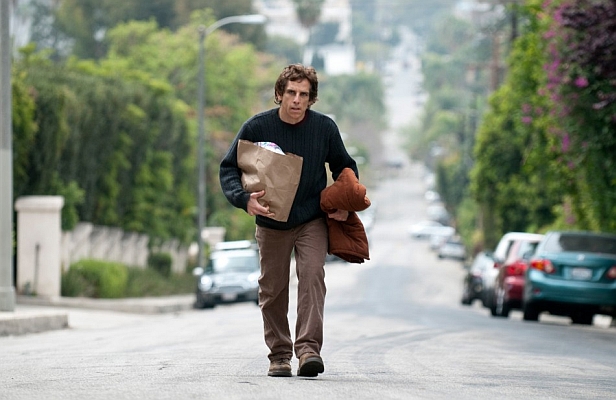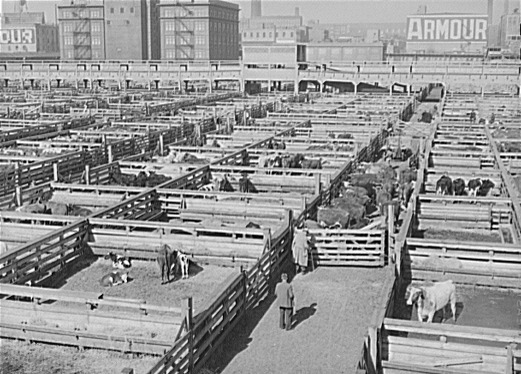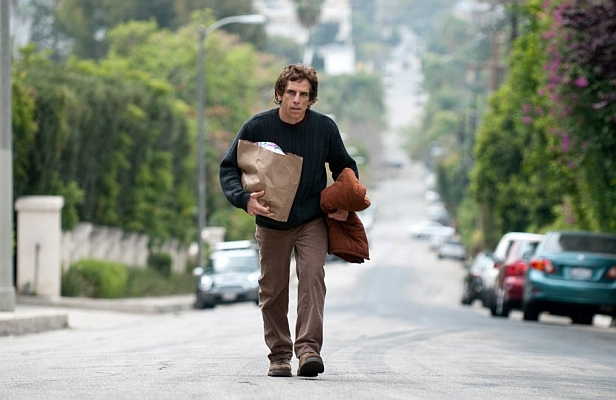 Greenberg, carless loserSlate’s Tom Vanderbilt takes a look at how Hollywood portrays the carless, leading off with Ben Stiller’s new movie Greenberg, about a loser of the same name:
Greenberg, carless loserSlate’s Tom Vanderbilt takes a look at how Hollywood portrays the carless, leading off with Ben Stiller’s new movie Greenberg, about a loser of the same name:
Greenberg’s inability to drive is treated as a weakness — watch him flail hopelessly at the SUV that cuts him off at the crosswalk! — but also as a more insidious character failing. As the reviewer for the Guardian put it: “Greenberg takes emotional advantage of … quiet, compliant people, not least because he’s that classically dependent figure, a non-driver in Los Angeles who needs people to transport him around town.” Once we all buy into the idea that the car is freedom, not having a car reads as a form of clingy, needy dependency.
Greenberg is just the most recent film in which a character’s non-automobility — whether for lack of a car or for lack of the ability to drive — is used for comic effect, whether as a metaphor for a deeper personality flaw or as a token of marginality and/or plain creepiness. As the humorist Art Buchwald once observed, “People are broad-minded. They’ll accept the fact that a person can be an alcoholic, a dope fiend, a wife beater and even a newspaperman, but if a man doesn’t drive, there’s something wrong with him.”
This attitude seems to flourish in Hollywood. I put a call out for examples on my blog, and readers found scads of them. Why does the film industry have such contempt for the carless? We could attribute it to the simple fact of the film industry’s base in Los Angeles, a place whose residents — film directors and otherwise — can hardly imagine life without a car.
So how do cyclists fare in movies?
Anything outside [the] dominant [autocentric] culture is treated as, well, a little weird. Hollywood’s representation of cyclists, for example, as blogger Bike Snob puts it, has “pretty much been nerds on 10 speeds.” The list of prominent bicyclists in film history includes misfit teens (Napoleon Dynamite), eccentric Einstein-like scientists (the license-less Jeff Goldblum character in Independence Day, in which the bike is, admittedly, shown as a pretty decent way to escape Manhattan), vaguely countercultural types (Mark Wahlberg’s character in I Heart Huckabees, or Carl Bernstein in All the President’s Men), perpetual man-children (Pee-Wee’s Big Adventure), and people who otherwise refuse to grow up or are out of touch with real life and the working world. (Consider the couch-surfing Owen Wilson character in You, Me, and Dupree, whose answering machine message announces: “If this is in regards to employment, please be aware that my Class Four driver’s license has expired.”)
Even worse, carlessness is shorthand for not getting any:
In The 40-Year-Old-Virgin, for example, Steve Carell is that rarest of filmic creatures: a bona-fide bike commuter, shown pedaling to work, navigating the various hazards of the traffic landscape. A boon for alternative modes, perhaps, except for the fact that the bicycle, like the character’s penchant for collecting action figures and his virginal status, is treated with a certain condescension. “I’m not the only person in the world who rides a bike,” he protests to his co-workers, one of whom replies: “Yeah, everyone rides a bike, when they’re f***ing 6.”
Just as there has long been an association between the car and sexuality (explored most notoriously in J.G. Ballard’s Crash), carlessness and abstinence have often been paired by Hollywood.
Still worse:
… Thom Anderson’s epic film Los Angeles Plays Itself (a hard-to-find compendium of great film moments shot in that city) points out an interesting subtheme of Chinatown, which comes midway after the Jack Nicholson character loses his car: “For the second half of the movie, he’s dependent on others. His sense of mastery disappears. He’s always one or two steps behind and he never catches up. … The loss of the car is a form of symbolic castration, both in the movies, and in life.”
The worst yet:
When carless people aren’t virgins or castrati, they’re typecast as sexual deviants. There’s the pedophile character (“Walter”) played by Kevin Bacon in The Woodsman; in one scene, Walter is given a ride by a co-worker, who says, “[T]here’s something wrong with this picture. … [H]ere’s this nice, hard-working guy who suddenly appears out of the blue and rides the bus to and from work. I mean, who rides the bus anymore?” “People without cars,” replies Walter. “Very weird,” says Vicki. Lack of car equals sexual perversity. This theme is repeated in Little Children, in which the convicted child molester R.J. (Jackie Earle Haley), ostensibly trying to re-enter society, places a personal ad seeking a relationship with a woman who, as Tom Perotta wrote in the novel, “didn’t mind the fact that he didn’t have a car.” (Woe to the woman who eventually steps forward.)
Okay, so pretty much the secret to unleashing carbon-free transportation is reforming Hollywood. You hear that, Ed Begley?



